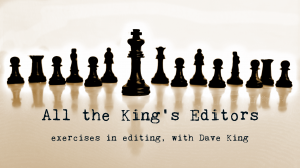The Editor’s Clinic: Balancing Character and Situation in your Hook
By Dave King | August 21, 2018 |

Once again this morning, we’re looking at how best to draw your readers into the story. Broadly speaking, there are two ways to do it. You can give your readers a gripping situation with dramatic possibilities. Or you can give your readers a character they want to get to know better. And as usual in writing, it’s best to do both.
In this opening chapter, the author is leaning too heavily in one direction. The situation – a young boy about to be alone with a priest who apparently has dark plans – is certainly dramatic enough. But the language the author uses, even for the nameless boy’s interior monologue, is far more mature than someone of altar-boy age would use. The interior monologue is in italics, as well, which puts distance between the narrative voice and the boy doing the thinking. And the only character with a name is Charles the custodian. So while the author does seem to dip into the boy’s head at times, the overall feel of the passage is as if it’s written from the omniscient narrator.
This is a mistake. While there may have been a time when the shock that a priest might be a threat to a young boy would have been enough to drive readers on, that situation has become sadly familiar. The way to draw readers into the story is to let them experience this moment of desperation along with the boy, and they can’t do that if the author is viewing him from a distance. Even if we never see the boy again – we don’t know what happens after this opening scene, and the next scene may start with the discovery of the boy’s body – we still need to feel we know and care about him in order to want to see what happens next.
So my editing is aimed at making the language more clearly the boy’s as a way of putting readers more firmly into his head. This will also make it possible to blend the interior monologue more seamlessly into the surrounding narration. Ideally, there shouldn’t be a line between what the boy sees and what the boy thinks. If readers feel his fear, his desperation, his despair, then they are going to want to see him either rescued or vindicated. Either way, they’re going to keep reading.
—
The priest Father Michaelson swept past the altar like he was floating. [1] across the dais with grace, although his heart held malice. [2]
A boy James glanced at him watched [3] from a pew near the front of the otherwise empty church. Father moved so smooth, did he even have legs under those long black robes? He pretended to flip through a hymnal, but he was really trying to decide if and contemplated whether his parents would believe him if he ran. decided to run. He imagined [4] hHis mother was probably at home fixingpreparing dinner, proud that Fatherthe priest had picked him out of all the other altar boys for to perform these extra duties after school. Peering over the book, he wondered how the man could move so silently, almost appearing to float. Are there even legs under those long robes?
When Father bent down behind the altar to put something away, hHe edged closer to the aisle.
“Going somewhere, my son?”
It sounded like the true voice of God. Its Father’s deep timbre voice echoed from the high ceiling and marble walls, surrounding Jameshim.
“No, Father.” He thought his own voice sounded weak meek by comparison—squeaky and scared. Well, hHe was scared. He tried again, this time in thea stronger voice, the more confident one Dad had been coaching him to use. “No, sir.” This time it sounded better, at least to him. Where are you, Dad?
He wished his dad could help him with the other thing.
He looked at the stained-glass figures in the windows above. Their eyes seemed to pity him cast down at him in pity. Jesus. Mary. Joseph. He asked for their help. Didn’t they stand for goodness, like Superman or Spider Man? [5] He thought about the superheroes in his comic books and imagined Wonder Woman bursting one sailing through the glass to save him like in the movie, but God was way more powerful than Wonder Woman. He wondered whether God was looking down, too. [italics removed] Why didoesn’t He do anything?
He watched Fatherthe priest clean up around the altar. His tall, thin build and long limbs made him look like a praying mantis. HisThe boy’s gaze moved upward, to the massive crucifix hung on the wall above the priest—Jesus pinned to it with his crown of thorns, eyes closed, blood dripping from wounds on his hands, feet, and sideabdomen.
[paragraph added]Fall. Fall on him. Fall on him, Jesus. You’re supposed to be the Savior. [6]
A booming sound made him jump. startled him as t The side door slammed behind Charles, the old black maintenance man. The kids all talked about how Charles had done time in prison, but w. Who knew if it was true? That was the least of his worries right now, anyway.
Charles looked over toward James. “AnythingWhat else can I can do tonight, Father?” Charles asked. He looked over toward the boy.
The boy read a look of concern on his face and tried to respond in kind, staring back hopefully. He James met Charles’ eyes. It was like Charles wanted to help him, wanted to reach out. Father treated Charles badly, too, though in a different way. It made James trusted Charles, who’d only ever been nice to him in the time they had spent together, and he’d always felt sorry for the priest’s harsh treatment of the man.
“Nothing more, Charles,” said the God-voice. “That will be all for today.”
Charles began to leave but hesitated. “You sure you don’t want me to sweep up in here?”
“That will be all, Charles.” The priest was polishing a silver chalice, his back to them both. “That will be all, Charles.”
Charles looked over at the boy James again. “Can I walk the kid home, then? He done here too?”
The priest turned to face them. His ruddy face and red hair seemed to glow under the lights. This time he spoke softly, but his voice made it clear commanded an end to the discussion was over. “That will be all, Charles.”
“All right then. See you tomorrow, Father.”
[paragraph added]He Charles walked up the aisle, patting James’s the boy’s shoulder on the way past, his footsteps echoing. The thick front door creaked as he opened it.
The boy turned to see James’ eyes followed Charles the whole way. He watched him pause in the doorway and look backas if pondering some other course of action. Their eyes engaged locked once more, and hope again filled his heart.
[paragraph added] Please. Please.
[paragraph added] Charles held the door wide open for a moment, then lowered his head and left.
[paragraph added] The boy James wondered if he could make it before the door locked behind the janitor. HBut he imagined the priest gliding down the aisle at warp speed on those long legs and grabbing him by the collar just as he reached it.
[paragraph added]It gasped slowly to closure and shut with a soft, final click.
[paragraph added]The boy James turned toward face the daisaltar again but found the priest Father’s robes in his face. There was a swish of satin as a long arm swept up and took hold of his shoulder.
“Come along, son. We have work to do in the rectory before you leave.”
The boy James rose as he always did. Father obediently, and as was his custom, the priest placed his hand on the nape of his neck to guide him, his thumb digging into the gap between his neck bones. vertebrae.
[paragraph added, italics removed]His hands awere always so cold.
[paragraph added] As they walked by the altardais, he gazed at the rows of flickering candles in small red jars. Other people’s , lit for the prayers of others. [7]
NOTES:
- This does not sound like the voice of a preteen boy. Would he refer to the priest as “The Priest?” And would his go-to vocabulary include phrases like “his heart held malice?” It’s not impossible, of course, but if you’re in the process of creating his character, you want your language to be typical, not exceptional.
- Also, I’ve noticed that a lot of writers seem to open their first scenes with summary sentences, almost like the old previews that used to open chapters. (“Chapter four, in which our hero discovers . . .”) I suspect the idea is to hit your readers quickly with the situation But this approach feels artificial.
- Use his name. Personalize him.
- No need to flag his imaginings as such. Just show them. Raders will get it.
- Be specific. You can convey his character in the details.
- Italics is appropriate for this kind of prayer. It’s a more self-conscious, articulated thought –more in internal dialogue.
- Excellent image to end the scene.
As always, you’re welcome to submit your own work to The Writer Unboxed stable of editors. You can find the guidelines here.
[coffee]










Powerful. Very helpful editing here, especially the omniscient vs. James’ perspective.
Thanks.
I’m sometimes a little hesitant to edit something so deeply. There’s always the risk that you’re writing the book you want to write rather than the one the client wants to write.
Hi Dave. Wonderful editing. I especially like the way you explain up front what the main problem is: a disconnect between inner and outer, and the need to make the character’s words appropriate. I also compliment the writer on presenting the custodian as he does, and the paragraph you add, in which the boy senses the man’s wish to help. It makes that door sweeping closed very effective. Once again, this new feature at Writer Unboxed is further evidence of how important it is for writers to find themselves a solid editor.
Well, thanks.
I kind of wonder whether there’s a connection between the way Charles the janitor stands out and the fact that he was the only character in the original version who was given a name.
And I like the description of the problem as a disconnect between inner and outer.
The beginning of a compelling story, horribly topical these days but still individualized by the characterization presented here and well revised in the vocabulary and thoughts of a boy that age. The addition of his wish that his dad could help him (1) conveys his desire for his dad to be a more savvy and effective dad and (2) identifies the problem for any reader who has not yet caught on (if such a reader exists).
Clearly the janitor is fully aware and wants to help but is stymied. He’ll be back, I’m sure, maybe even as a last-minute rescuer, or as a witness in court (discounted at first because of his race and prison background, but ultimately plausible).
The revision of the comic-book passage is nicely done, but I would have liked the boy to imagine, having just appealed to the stained-glass images of the holy family, that Mary herself might burst out of the window (like Wonder Woman) to come to his aid. Too close to antic wit? Maybe, but it might be worth a try; certainly not beyond the imagination of a boy under stress.
Charles the janitor does stand out, doesn’t he?
And I like the Mary/WW connection. It reads to me less like antic wit and more how the imagination of a preteen boy might work.